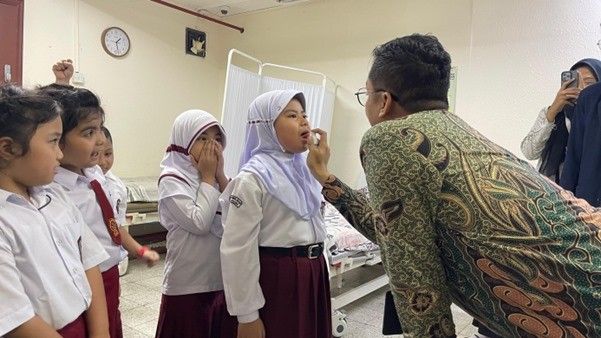UNESA Faculty of Medicine Lecturer Team Provides Health Education and Digital Literacy at Indonesian School in Jeddah

Unesa.ac.id, SURABAYA-The Faculty of Medicine (FK) Lecturer Team at Surabaya State University (UNESA) continues to contribute to improving the quality of public health through Community Service (PKM) activities. The activity with a focus on two important adolescent issues was carried out at the Indonesian School of Jeddah (SIJ) on Sunday, September 29, 2024.
The implementers of this activity include Dr. dr. Endang Sri Wahjuni, M.Kes., Nur Ilahi Anjani, S.Ked., M.Kes., Abdul Fauzi, S.Kep., Ns., M.Kep., Satria Eureka Nurseskasatmata, S.Kep., M.Kep., Nidya Comdeca Nurvitriana, S.Tr.Keb., M.Keb., and Fedelita Aistania Putri, S.Keb., Bd., M.Kes.
Endang Sri Wahjuni, the chief executive revealed that one of the problems faced by junior high school students is the lack of knowledge about the menstrual process. They do not fully understand what happens to the body during menstruation, causing confusion and discomfort.
“Knowledge about puberty and menstruation is very important to help students deal with physical and emotional changes better,” she said.
The implementation of the activity includes counseling on adolescent reproductive problems conducted online through Zoom with a prepared module, followed by SIJ high school students, as well as offline physical health checks aimed at SIJ elementary school teachers and students, with pre-test and post-test to measure the level of understanding of participants before and after counseling.
In addition to the issue of menstruation, the Dean of the Faculty of Medicine also highlighted the challenges faced by high school students related to free access to information on the internet and social media. High school students often access the internet without adequate supervision, making them vulnerable to exposure to inappropriate or even misinformed content.

According to him, digital literacy is crucial to be taught so that students can sort out information wisely and not be carried away by the flow of misinformation.
The counseling provided by the PKM FK UNESA team focused on two main materials, namely education on puberty and menstruation for junior high school students, and digital literacy for high school students. She hoped that the students would be ready to face the changes that occur to them with sufficient knowledge, both in terms of reproductive health and in the use of information technology.
In counseling for junior high school students, she explained about the stages of puberty, which is an important transition period from children to adults. Puberty in girls is marked by the first menstruation or menarche.
“Menstruation is a natural process that must be well understood by every woman. Symptoms such as breast tenderness, headaches, and abdominal cramps are common, but with the right understanding, they can deal with it more calmly,” she said.
Meanwhile, high school students received counseling on digital literacy, which includes the importance of filtering the information they get from the internet. The dean also emphasized that in today's digital era, information can be easily accessed, but not all of it is suitable for consumption.
“Students need to understand the limits of accessing online content. They should be able to differentiate between valid information and risky or inappropriate information,” she explained.
He also encouraged students to be more critical in using social media, so as not to be trapped in information that can damage their mindset. With this counseling, the team hopes to have a positive impact on the development of SIJ students, both in terms of health knowledge and digital literacy. []
***
Reporter: Mohammad Dian Purnama (FMIPA)
Editor: @zam*
Photo: FK UNESA PKM Team
Share It On: